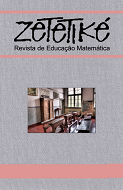Abstract
The objective of this paper is to discuss the approach of Statistical Education in the early years of Elementary School, which favors the development of children's creativity and critical thinking through the resolution of real problems. It is argued that the teacher has a fundamental role in the training of students, with regard to methodologies that highlight their protagonism and promote the collective and collaborative production of knowledge. The results indicate that the formation of creative and critical thinking is directly linked to a school with democratic principles, in which respect for diversity, collaborative work and dialogue are considered in the resolution of real problem situations.
References
Alencar, E., & Fleith, D. S. (2008). Barreiras à promoção da criatividade no ensino fundamental. Psicologia: Teoria e Pesquisa, Brasília, 24(1), 59-66.
Alencar, E., Braga, N., & Marinho, C. (2017). Como desenvolver o potencial criador (12ª ed., pp. 19, 20, 31). Rio de Janeiro: Vozes.
Alonso Herrera, A. T., & Campirán Salazar, A. F. (Coords.). (2021). Pensamiento crítico em Iberoamérica: Teoria e intervención transdisciplinar. México: Editorial Torres.
Ministério da Educação. (2018). Base Nacional Comum Curricular (Proposta preliminar. Terceira versão revista). Brasília: MEC. Recuperado de http://basenacionalcomum.mec.gov.br/wpcontent/uploads/2018/12/BNCC_19dez2018_site.pdf.
Buehring, R. S., & Grando, R. C. (2019). Pesquisas brasileiras em educação estatística na infância: suas contribuições para o campo de investigação e para a prática. REVEMAT, Florianópolis (SC), 14, 1-15. http://doi.org/105007/1981-1322.2019.e62836.
Burrill, G. F., Souza, L. de O., & Reston, E. (Eds.). (2023). Research on reasoning with data and statistical thinking: International perspectives. Switzerland: Springer Nature.
Carbonell, J. (2022). Prólogo. In Díez Gutiérrez, E. J., Pedagogia antifacista: construir uma pedagogia inclusiva, democrática y del bien común frente al auge del facismo y la xenofobia (pp. 7-9). Barcelona: Ediciones Octaedro.
Carvalho, T. C. M. (2021). Pensamiento crítico y creatividad: su confluência en el ámbito educativo. In: A. T. Alonso Herrera, & A. F. Campirán Salazar (Coords.) Pensamiento Crítico em Iberoamérica Teoria e intervención transdisciplinar. México: Editorial Torres Asociados.
Corrêa, S. A. (2019). A insubordinação criativa e o processo dialógico na educação estatística na infância. 189 p. [Dissertação de Mestrado em Ensino de Ciências, Universidade Cruzeiro do Sul], São Paulo.
Díez Gutiérrez, E. J. (2022). Pedagogia antifacista: construir uma pedagogia inclusiva, democrática y del bien común frente al auge del facismo y la xenofobia. Barcelona: Ediciones Octaedro.
Fisher, R. (2013). Diálogo creativo. Hablar para pensar en el aula (Trad. de Pablo Manzano Bernárdes). Madrid: Morata.
Fischer, S. C., & Spiker, V. A. (2000). A framework for critical thinking research and training. Report prepared for the U.S. Army Research Institute: Arlington.
Fleith, D. S. (2011). Desenvolvimento da criatividade na educação fundamental: teoria, pesquisa e prática. In S. M. Wechsler, & V. L. T. Souza (Eds.), Criatividade e aprendizagem. Caminhos e descobertas em perspectiva internacional (pp. 33-51). São Paulo: Loyola.
Fonseca, M. G., & Gontijo, C. H. (2021). Pensamento crítico e criativo em Matemática: uma abordagem a partir de problemas fechados e problemas abertos. Perspectivas da Educação Matemática, Campo Grande, 14(34), 1-18. http://doi.org/10.46312/pem.v14i34.12515.
Freire, P. (2015). Pedagogia da autonomia (52ª ed.). São Paulo: Paz & Terra.
Freire, P., Freire, A. M. A., & Oliveira, W. F. (2014). Pedagogia da solidariedade. São Paulo: Paz & Terra.
Fróis, J. P. (2014). Introdução. In L. S. Vigotski, Imaginação e criatividade na infância (pp.VII - XV). São Paulo: Martins Fontes.
Gontijo, C. H. (2023). Estímulo do pensamento crítico e criativo em matemática: uma proposta de oficinas. Revista de Educação Pública, 32, 300–324.
Halpern, D. F. (1989). Thought and knowledge: An introduction to critical thinking. New Jersey, USA: Lawrence Erlbaum Associates.
Halpern, D. F. (2006). The nature and nurture of critical thinking. In R. Sternberg, H. Roediger III, & D. F. Halpern (Eds.), Critical thinking in psychology (pp. 1-14). Cambridge: Cambridge University Press.
Hooks, B. (2020). Ensinando pensamento crítico: sabedoria e prática. São Paulo/SP: Elefante.
Kneller, G. F. (1978). Arte e ciência da criatividade. São Paulo: IBRASA.
Lopes, C. E. (2021). Tessitura possível entre letramento estatístico, pensamento crítico e insubordinação criativa. In C. Monteiro, & L. Carvalho (Orgs.), Temas emergentes em letramento estatístico (pp.60-87). Recife: UFPE.
Lopes, C. E. (2008). Reflexões teórico-metodológicas para a Educação Estatística. In
C. E. Lopes, & E. Curi, Pesquisas em Educação Matemática: um encontro entre a teoria e a prática (pp. 67-86). São Carlos/SP: Pedro & João Editores.
Lopes, C. E., Augusto, A. F. de C., & Toledo, S. E. R. G. O. (2023). Development of a statistical research project in childhood: interfaces with life sciences. Statistics Education Research Journal, 22, 1-15.
Lopes, C., & D’Ambrosio, B. (2015). Perspectivas para a educação estatística de futuros educadores matemáticos de infância. In S. Samá & M. P. M. Silva (Orgs.), Educação estatística: ações e estratégias pedagógicas no Ensino Básico e Superior (pp. 17-27). Curitiba: CRV.
Vieira, R. M., & Tenreiro-Vieira, C. (2021a). Pensamento crítico e criativo na educação em ciências: percursos de investigação e proposta de referencial. In N. Kiouranis, R. M. Vieira, C. Vieira & V. Calixto (Orgs.), Pensamento crítico na Educação em Ciências: Percursos, perspectivas e propostas de países ibero-americanos (pp. 17-42). São Paulo: Editora Livraria da Física.
Vieira, R. M., & Tenreiro-Vieira, C. (2021b). 25 anos de investigação, formação e inovação sobre pensamento crítico na Educação. In A. T. Alonso Herrera & A. F. Campirán Salazar (Coords.), Pensamiento Crítico em Iberoamérica Teoria e intervención transdisciplinar (pp. 23-44). México: Editorial Torres.
Vigotski, L. S. (2014). Imaginação e criatividade na infância. São Paulo/SP: WMF Martins Fontes.
Woods, P. (1999). Aspectos sociais da criatividade do professor. In A. Nóvoa (Org.), Profissão professor (pp. 125-153). Portugal: Porto Editora.

This work is licensed under a Creative Commons Attribution-NonCommercial-NoDerivatives 4.0 International License.
Copyright (c) 2023 Zetetik´é


